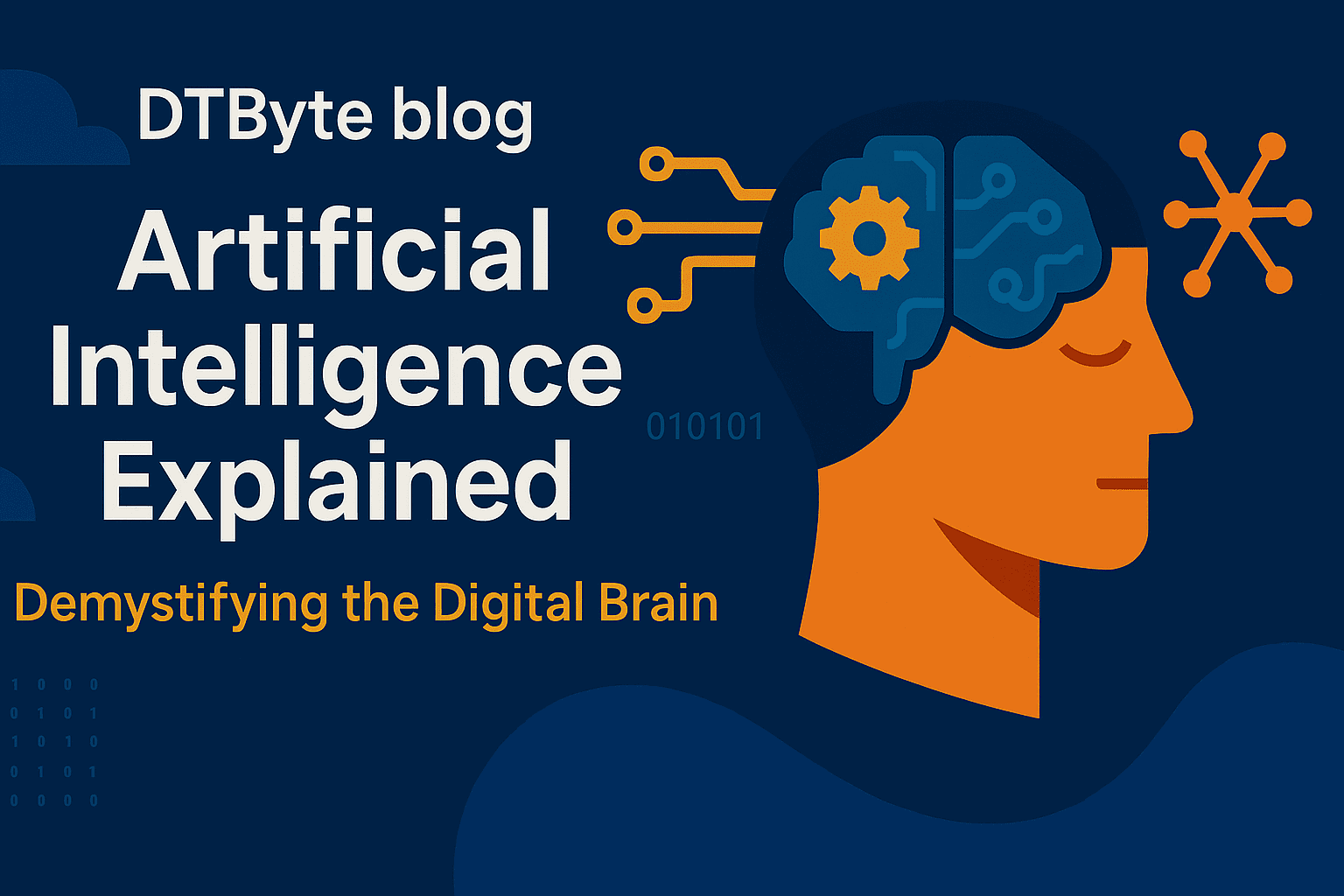Artificial Intelligence Explained: Demystifying the Digital Brain

Hello again and welcome to the DTByte blog!
In our previous post, we talked about how to create blog publications that connect with our audience. Today, we take the first step in our journey through the fascinating world of technology, addressing one of the most talked-about and often misunderstood topics: Artificial Intelligence (AI).
You probably hear about AI constantly: in the news, movies, and even in the devices we use daily. But what exactly is Artificial Intelligence? Is it that science fiction superintelligence or something more tangible and present? Join us as we demystify AI and explore its impact today.
What Exactly is Artificial Intelligence?
In simple terms, Artificial Intelligence is the ability of machines to imitate human cognitive abilities such as learning, reasoning, perception, and decision-making, with the goal of performing tasks that normally require human intelligence.
It is important to distinguish between:
- Weak AI ( or Narrow AI): Designed and trained for a specific task (like Siri recognizing voice commands or a recommendation system on Netflix). Most of the AI we experience today is weak.
- Strong AI (or General AI): A hypothetical AI with generalized human cognitive abilities, capable of understanding, learning, and applying knowledge to solve any problem, similar to a human being. We are still far from achieving this.
Why is AI So Relevant Now?
AI is not a new concept (it's been around for decades), but its current relevance is due to several convergent factors:
- Large Amount of Data (Big Data): We have access to massive volumes of data, which are the "fuel" that powers AI algorithms to learn and improve.
- Increased Computational Power: Advances in hardware allow processing these large datasets at speeds previously unimaginable.
- More Sophisticated Algorithms: Researchers and developers have created more powerful and efficient machine learning and deep learning algorithms.
These factors have allowed AI to move from theory to having impactful practical applications in almost every industry.
Real-World Applications of AI
AI is already integrated into many aspects of our lives and businesses:
- Virtual Assistants: Siri, Google Assistant, Alexa, etc., use natural language processing powered by AI to understand and respond to our requests.
- Personalized Recommendations: Platforms like Netflix, Amazon, and Spotify use AI to analyze our habits and suggest content or products we're likely to enjoy.
- Autonomous Vehicles: AI is fundamental for self-driving cars to perceive their environment, make real-time decisions, and navigate.
- Medical Diagnosis: AI helps doctors analyze medical images (X-rays, MRIs) to detect diseases with greater accuracy and speed.
- Fraud Prevention: Banking and financial systems use AI to identify suspicious patterns and prevent fraudulent transactions.
- Industrial Automation: AI-powered robots perform complex tasks in factories, increasing efficiency and reducing errors.
- Marketing and Sales: AI analyzes consumer behavior to personalize advertising campaigns and improve sales strategies.
Challenges and Ethical Considerations
Despite its potential, AI also presents significant challenges:
- Ethics and Bias: AI algorithms can inherit or amplify biases present in the data they were trained on, leading to unfair or discriminatory decisions.
- Data Privacy: AI systems often require large amounts of personal data, raising concerns about how this data is collected, stored, and used.
- Impact on Employment: AI-driven automation could displace workers in certain industries, requiring social and economic adaptation.
- Security: AI systems can be vulnerable to attacks or malicious use.
Proactively addressing these challenges is crucial to ensure that the development and implementation of AI benefit society as a whole.
The Future of Artificial Intelligence
The field of AI is constantly evolving. We expect to see significant advancements in areas like conversational AI (making it more natural), explainable AI (understanding why an algorithm makes a decision), and the integration of AI into new fields like materials science or climate change.
The pursuit of more general AI (Strong AI) continues, but it remains a long-term goal with many technical and conceptual barriers yet to be overcome.
In Conclusion
Artificial Intelligence is not just a movie concept; it is a powerful technology that is already shaping our present and will define our future. From simplifying our daily tasks to addressing complex global problems, the potential of AI is immense.
At DTByte, we believe that understanding AI is fundamental to navigating today's technology landscape. We hope this post has shed some light on this fascinating topic.
This is just the first step. In future posts, we will delve deeper into specific aspects of AI and other emerging technologies.
Now we'd love to hear your opinion: What AI application surprises you the most or seems most promising? Leave your comments below!